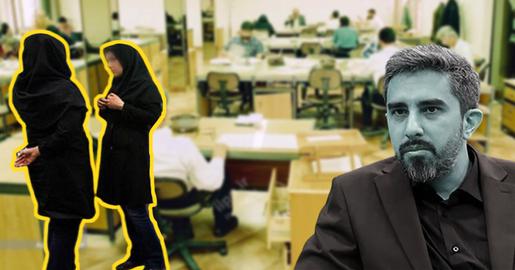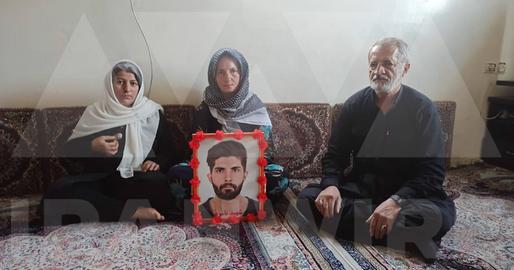Mahnaz Mirzaei is the first Iranian female miner. When it comes to the world's toughest jobs, mining is definitely at the top of the list. Media photographs of miners often show tired men wearing clothing that offers them no protection, and sometimes they are not even wearing hardhats to protect them from falling debris they might encounter on the job.
Photographs of women working as miners are scarce. And a photograph of the only woman working in an Iranian mine could change the way people view mining forever.
Mahnaz Mirzaei was born in Zarand, Kerman, in 1980. She has been interested in mining since her teens and has been working in the industry for 17 years. Mirzaei is currently the head of Sara Pardeh coal mine in Kerman province’s Kuhbanan County. "Before me there were women who worked in open-cast mines, but I'm the first woman to go underground and mine tunnels," she said in an interview.
Mahnaz Mirzaei was so interested in mining that she decided to follow her education in this field. She holds a bachelor's degree in mining engineering, specializing in exploration, from Shahid Bahonar University in Kerman.
She says that although many people had told her mining would be a difficult job for a woman and she would have trouble finding a job because of her education, it was relatively easy for her: "Many people tried to frighten me about the hard work in mines and to persuade me to give up. But I knew all its hardships and, naturally, I became familiar with all the negative aspects of working in a mine when I studied at university. What they said did not distract me from my interest. While looking for work, I found a coal mine that needed a mining engineer. I filled out the application and they accepted me."
The patriarchal thinking that dominates Iranian society feeds the idea that some jobs are “masculine" — and this is a misconception that women's movements have tried to change over the years. Despite all these efforts, women like Mahnaz Mirzaei still face discrimination and have to work hard to fight against it.
She speaks about her first experience in a tunnel: "I entered the mines during my undergraduate studies, but when you enter this space because it is your job it's another story. I remember that, on the first day of work, a man who tried to discourage me kept walking next to me in the tunnel. He kept asking me whether I was tired. And even though I was very tired, I would tell him that I wasn’t."
She also talks about the continuing sexist outlook of some of her colleagues and acquaintances even though she has been working in the mine for many years: "From the first day I went to work in the mine, all of my colleagues were men. For me, it wasn't a complex issue, but some of my colleagues could not deal with it. They simply said that a woman should not give orders. Or they asked me: ‘You’re a woman. How can you go underground in the tunnel?’ But after a while, when I was promoted and became the chief of Sara Pardeh coal mine, they finally accepted me.”
…The Child of the Mine
Mahnaz Mirzaei's family has been sympathetic and supportive. Stereotypes did not limit her, but the anxiety and the dangers of working in the mine were always there: "I worked in the mine before I got married, and my husband knew that my job was my priority, so naturally he didn't mind and always admired my courage." Her husband and her brother have both worked in the same mine.
Mahnaz Mirzaei says she returned to work just days after her first child was born, bringing the baby with her to work, despite the difficulties of doing so. She says when she was required to go in the mine, she left her daughter — who she nicknamed “the child of the mine” — with her colleagues in the office. Her daughter is now 10 years old. "My daughter is very interested in the mine and often comes to me and says she wants to work in the mine in the future. She is growing up here."
As head of the company, Mahnaz Mirzaei oversees 150 male workers and a female accountant. She says there are other women working in open-cast mines but, as the head of the mine, she would gladly accept women who volunteered to work underground and in the tunnels.
She has never been afraid of the hardship of working in the mining industry, saying it is as difficult as any other job can be. In her opinion, making one’s way on the different slopes of the mine and traveling through the tunnel to reach the extraction site are the most difficult parts of the job: "Sometimes the worker has to stand and work with a jackhammer on a 50 degree slope. The tunnel is dark and the worker must work in the dark using only a dim light."
Mirzaei says anyone entering into the job accepts the risks involved, as with firefighting and other dangerous and potentially life-threatening jobs. She’s aware that a miner’s working conditions are unique and that there are both physical and mental pressures for those working in the mines.
She has witnessed accidents in the workplace over the years, including physical injuries endured by her colleagues. She has also witnessed two fatal accidents, in 2000 and in 2010. She says she will never forget these experiences. She says she does all she can to improve the workers’ conditions.
Mahnaz Mirzaei says she loves her job, and she believes she is proving that she is no less capable than a man. She has fought with many people and has convinced many people of her competence and expertise. "I remember the days when the miners didn't take me seriously as a mining engineer because I was a woman, but they finally realized my skill and ability. The Sara Pardeh mine is one of the best mines in the northern part of Kerman province," she says.





























comments